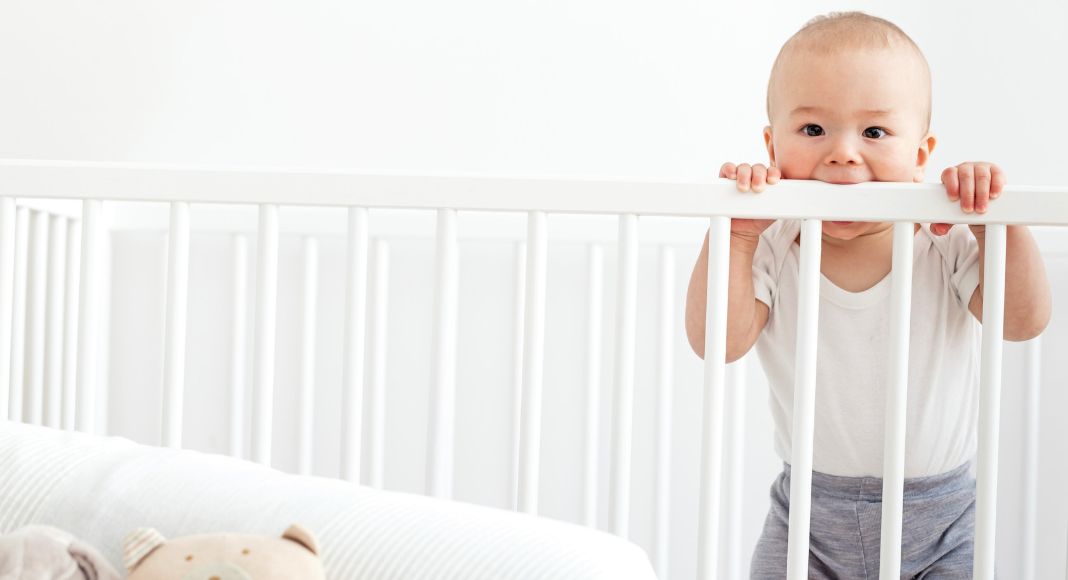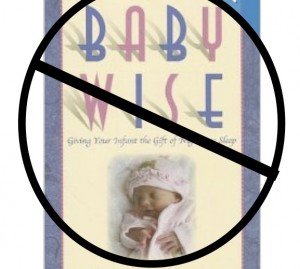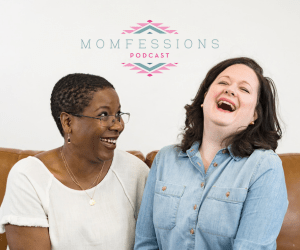 I don’t have many regrets in life. But, I sincerely wish I could rewind time and have a do-over with my firstborn. Why? In a word (although technically it should be two): Babywise.
I don’t have many regrets in life. But, I sincerely wish I could rewind time and have a do-over with my firstborn. Why? In a word (although technically it should be two): Babywise.
In fact, I’d be so bold as to say that Babywise (a method of sleep training found in a book by same name by author Gary Ezzo) made my first six months of motherhood miserable and may have contributed to some of the insecurities I see surfacing as the child I subjected to this method ages.
My perspective on this subject is somewhat unique in that I had four babies within a window of five years. Though I have friends that claim both “victories” and “failures” using the system, I feel my condensed childbearing timeline gave me a special opportunity to test Babywise’s methods against others (mainly trusting my instincts).
My story is a common one. A friend recommended the book because it worked for them. I was entering unchartered territory and desperate. So, I’d read anything I could get my hands on.
To a brand new mom, sleeping through the night is that big elusive milestone. It seems the sooner your children reach it the bigger the “motherhood merit badge” you earn. The concept of following a method to meet that goal sounded delightful.
That’s what Babywise offered. So, I bit.
There was a certain degree of logic to it. The book knew exactly how to appeal to me. It lured in the part of me that desperately longed to have a child without changing my comfortable “childless” life at all.
It also convinced me (temporarily) that the problems in the world today are created by how “baby-centric” parents become. Since I didn’t want to raise a selfish child, it only made sense to demand this creation of mine to fall in line.
The problem was Babywise didn’t work at all like it should have. Instead of realizing that maybe the system (or the author and his theories) were at fault, I blamed myself. Already struggling with some degree of post partum depression, I faced a rough reality check. Parenting was going to be a lot harder than I ever dreamed.
My first few months with Babywise resulted in a stressed out, frazzled, demoralized, depressed new mom whose perceived failure at having the Babywise method work was just another strike against her.
I had acquaintances that swore by it…touting the only way they could do it (turn off their instincts to follow Babywise that is) was to go outside and talk on the phone or get in the shower and turn on music. This would drown out the cries. They encouraged me to do the same…it would be “hard” on me but “good” for the baby.

Now, I think about this advice as preposterous. If my four-year-old needed me because he was hurting or scared and I went outside so I couldn’t hear him crying…that would be cruel, right? Or, better yet, if I was sad, lonely, hungry, or just feeling insecure and I was crying in bed and my husband got in the shower to tune me out, that would sound like abuse, wouldn’t it?
The challenge for most new mothers (myself included) is that I didn’t know whether or not I could, or should, trust those instincts. I was paralyzed with fear that I would do it wrong. Simultaneously I was concerned that I didn’t even know what “wrong” was in this arena. I was more tired than I had ever been in my entire life. So, I bounced between reading the book desperately to figure out what page I must have missed or what I must have been messing up to get it to work correctly and cursing the book for making me so miserable.
After encouragement from my mother (who read the book and thought it was insane) to experiment with things like feeding to sleep, napping in the swing, and co-sleeping, things started to go a little better. Oh, and my almost three month old son–who had gotten so frustrated he had taken to head banging–stopped that behavior as soon as I gave up the Babywise method and started answering his cries.
It was very hard to quit though. I felt tremendously guilty for not following the book and was concerned that like the book promised, once I put the baby in our bed he’d be in there until he was at least 12. But, I was at the point of desperation. I needed some sleep. He needed some sleep. And, (shockingly) her suggestions were working better than Mr. Ezzo’s.
I also recognized that my son had some digestive issues. (Four children later I’m able to diagnose exactly what they were better than any of my firstborn’s pediatricians ever could.) In addition to his problem with acidic foods and dairy, because of the Babywise feeding rules, I was way over feeding the little guy. Truth is, it’s impossible to know this stuff as a new mom. I was so concerned about him gaining weight and going to bed full that the thought of him eating too much and that causing digestive issues never crossed my mind.
Baby two came just 16 months after baby number one. This time I followed my gut. She slept in the swing frequently. If she fell asleep while eating I’d put her down. She slept through the night at five months old and, although we co-slept when needed those first few months, never slept in our bed after six months of age.
Is Babywise completely ineffective for everyone? No. I do have friends that will still swear that it worked for them. (I know some of you reading this are thinking you had no troubles with it.)
But, mommy friends, looking back I think this method is scary dangerous. And, although it may be getting some children to sleep through the night faster, the long term consequences are real and far more important than that first “sleeping through the night” milestone. You can’t think about what your child will be like at six or seven when all you want is to make it through the first year. But, let me encourage you that your parenting isn’t finished when they start sleeping. It’s only just begun…
Some recent studies have come out about the consequences of having infants cry it out and what happens when our newborns don’t attach well. Beyond that, this study explains how you aren’t really training an infant to sleep when you don’t respond to cries. Instead, the baby’s neurological system shuts down from frustration and sleep follows.
These reports cite correlations with more stressed out and anxious children later. I can attest to this. I see differences between my Babywise baby and my other children. My oldest displays more fear, has a more difficult time with expressing emotion, and is very guarded.
Of course, I understand that each child has a unique personality and that maybe that’s his natural bent. But, as I read the reports like this one on the impact of systems like this, I can’t help but see some similarities in my now-seven year old.
Being a mom is the hardest job I’ve ever had. And, like most new moms, I was desperate for some guidance on how to do it “right.” But, I think we moms, at all stages, have to free ourselves of that pressure. There isn’t a right way or a wrong way. There is your way and there is my way.
Every child we have added to our family has done some degree of messing up the rhythms for the rest of the family. Everyone has had to adjust as each new baby has come along. The Babywise method of make the baby fit you just doesn’t make any sense to me, at any level, anymore. Scheduling has some merit…routine has lots of merit… But, Babywise as a comprehensive system to be followed to the tee, is a bad idea.
Now, on the other side of newborns, I certainly wish I had researched more about the author, his background and lack of credentials before I put my child through his system. I’m embarrassed that I trusted this unknown man to tell me how to raise my newborn.
I hope you’ll do the same and avoid my regrets.
To read a counter opinion, check out Why I Stuck With Babywise.














Interesting article. I used my intuition in combination with Baby Wise methods for 3 out of 4 kids. By baby number four there wasn’t the time for such a ridged schedule. For baby #1 it didn’t really work. She still woke up a few times a night, which ultimately wasn’t a big deal. She usually went back to sleep. (Once she was older, around 5 months.)
I followed the book most strictly with baby number two. Interesting enough, she was a bit nervous as a toddler and developed some anxiety around the age of 7. By nature she’s a very shy child but it has me wondering…..I have to mention that she went to two funerals and experienced me accidentally running over her beloved cat around that same time so…was it these experiences or baby wise that has created anxiety? I just don’t know. Her anxiety is a fear that she could become ill or is ill—this manifested itself a few months after my dad’s death.(My dad was very ill before his death….)
I also have a babywise following friend whose 8 yr old daughter suffers from anxiety. I’d say more clearly so than my daughter. Mom says she herself suffers from anxiety but has also blamed her daughter’s anxiety on babywise. I do know this mom to be very “by the book” and a strict rule follower so I wonder if she ignored intuition and did she misinterpret the book or go by a hard fast 20-30 minute cry rule? Or is this anxiety hereditary?
I can definitely see babywise disturbing a child’s development if parents are constantly letting their baby cry all alone for 20-30 minutes straight every time they lay baby down to sleep. I don’t recall the book giving a 20 minute hands off rule but I haven’t read it in a while. I do remember the recommended pat on the back. I remember thinking “my babies needed more than a tiny pat.” If my babies fussed I was usually back in the room after no more than 10 minutes. I didn’t just pat their back and leave. I sang and rubbed their backs several minutes. If they weren’t comforted I picked them up, putting their face on my neck and continued to talk and sing, then I laid them down. If I felt that wasn’t enough and they needed to nurse to sleep I let them but avoided it if I didn’t feel they needed that connection for sleep.
I really think if parents felt the need to ignore any intuition and were too hard nosed with the “rules” of the book or misinterpreted the guidance (like go shower and ignore your kid) then yeah- it could definitely create problems. Baby 2 and 3 slept through the night (6-7 hours) at 9 weeks old but it only lasted 2 months, then they both started waking up briefly once a night to nurse until I stopped nursing. I used this program but by baby four I only used it loosely. Baby four sleep patterns were similar to baby 2 and 3 but without the stress and strain of welding a schedule that at times felt like more of a burden than just waking up too much at night.
The program has good things to pick out from it but beware that parental intuition needs to be used, not ignored, and it should be used as a guide. Don’t let it stress you if it’s not done with every t crossed and i dotted or you won’t enjoy your baby.
But- my guess is that the book is getting enough negative reviews it will and probably is becoming an old fad and new ones are taking its place as “the thing to do.” And my sympathy to anyone who feels babywise caused their baby harm. Personally I don’t regret babywise but I see I could have read other books so as to have other points of view and I’ve learned I should read up on authors of any parenting book out there, as I did not research other books or author background when raising my infants.
I gotta say….no matter what….some sorta schedule seems helpful. As I’ve watched Moms go at 100% “on demand” feeding and are totally dependent on mommy to be next to them to sleep, it seems their baby’s are more fussy and get less sleep at night.
Our two kids thrived on Babywise (as did our friends who did it along with us) while our demand feeding friends pulled their hair out and their babies were miserable. Your description of Babywise is such an inaccurate caricature, it makes me wonder if you even read the book at all. Cast stones if you’d like, but it’s only to your and your baby’s detriment. The proof is in the pudding. The patents of the miserable kids who demand fed, with babies in slings 24/7, and family beds used to excuse it away by telling us, “but my baby is happy on the inside”. Meanwhile those of us who used Babywise principles just looked at our joyful, adjusted, healthy kids and figured we prefer demonstrable facts over mumbo jumbo.